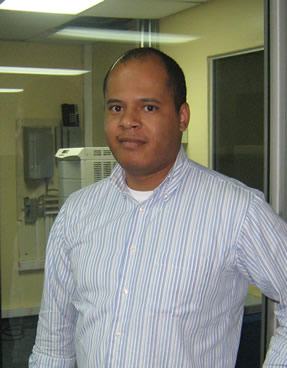
Hamlet Batista is the best SEO I’ve ever met. He cut his teeth by being at the top of Google for keywords like Viagra and Phentermine. You can’t always tell who is good and who isn’t in SEO. But I saw Hamlet on the front page of Google for the keyword Phentermine for at least 6 months. Hamlet has spent quite a bit of time in some controversial areas of the Internet and I present it without comment. It’s rare someone like Hamlet speaks so directly about what he has done. Since that time Hamlet has evolved from being an affiliate to being a merchant to creating software, called RankSense, which helps people do their own SEO.
Full Interview Audio and Transcript
Personal Info
Hobbies and Interests: Playing Chess, Reading, Watching TV.
Favourite Sports Teams: Las Aguilas.
Favourite Books:
- Science, Fiction, Thrillers
- Timeline by Michael Crichton
Favourite Entrepreneurs: Steve Jobs, Sony Founders.
Company Website: http://www.ranksense.com
Fast Track Interview
Adrian Bye: Today, I am talking with Hamlet Batista from RankSense. His software program helps with the ranking of sites. Hamlet, why don’t you tell us a little bit about who you are and share how you started with the Internet?
Hamlet Batista: I was born in Puerto Plata, but I was raised in Santiago, Dominican Republic. I have always been attracted to technology. When I was a kid, I played a lot of video games and kept a notebook of all the games I was able to complete. I went on to study Telecommunications Engineering, which had a mix of Electronics Engineering, Computer Science, Programming, and Internet classes.
When I moved to Santo Domingo, I worked with Codetel for two years as a System Administrator. I then worked with Party Poker for a year as a consultant developing software.
After I started to see all the problems at Party Poker, I decided to start my own company. I spent three months testing different things such as e-mail marketing. A marketer, who used to work for Party Poker, informed me that he was doing pay-per-click. I then started with pay-per-click on Google and Yahoo to promote Viagra. That first month I made $1,000. After that, I made $8,000 a month as a Viagra affiliate.
Adrian Bye: Which is a fortune in the Dominican Republic. How did you make the move into search?
Hamlet Batista: One day, I saw a competitor’s site on the organic results. I discovered he hired a link network called AutomatedLinks. That network puts links in the page footer by including a PHP code on the page. You then have invisible links with different anchor text text pointing to various sites.
I registered for that service from a Google cached page and started ranking. I jumped from $8,000 to $15,000 a month. However, that only lasted for two months because Google killed the automated links and all the listed sites. I then spent more time researching the top-ranking sites. When I got to the first page of Viagra on Google with my Pillrank.com site, I started making about $50,000 a month. I eventually got to $100,000 or $120,000 with Viagra.
Adrian Bye: What was your highest ranking on Viagra?
 Hamlet Batista: My highest ranking on Viagra was number three. Nobody has been able to get to number one because Viagra is always at the number one spot. With Phentermine, we were number one and made an average of $180,000 or $200,000 a month. We even reached $300,000 one month.
Hamlet Batista: My highest ranking on Viagra was number three. Nobody has been able to get to number one because Viagra is always at the number one spot. With Phentermine, we were number one and made an average of $180,000 or $200,000 a month. We even reached $300,000 one month.
Adrian Bye: A couple of years ago we talked about how you split-test organic results. Can you share how you did that?
Hamlet Batista: We were able to have several sites rank with our split-testing. We had 10 or 11 sites using different strategies with target terms and tactics. Depending on which sites were moving up and down, we knew how we needed to modify our site.
For example, we had some sites linking only one or two small keywords in the anchor text. Some sites had anchor text with long phrases that were variations of the different keywords. Other sites were mixing the brand of the site, the name of the site, and the URLs.
Adrian Bye: You also had a team getting backlinks. How did that work?
Hamlet Batista: Building links is the most critical aspect for ranking, especially when targeting the most competitive terms. I had a team of 20 guys building links. They had to identify where to get the links and how to make the anchor text of links. They had to go to the directories, read the directory requirements, and evaluate whether or not the directories were good. Then they had to place the links from our sites. At first, we did link exchanges and then niche directories.
Adrian Bye: What about keywords?
Hamlet Batista: For a merchant, it’s easy for your analytics to tell you the best-converting keywords because the visitor is on the same site. As an affiliate, I also wanted that information so I could focus on the most important keywords.
I had a script on my site that would record the keyword that referred the visitor. I had another script that would include the cookie, or direct campaign ID, and pass it to the merchant when I sent a visitor to that merchant. When the sale was made with the merchant, I was able to identify and track the best-converting keywords.
Adrian Bye: You’re not doing this now. What happened?
 Hamlet Batista: The payouts are not as attractive in other industries, such as mortgages and in pills because the merchant makes most of the money. They don’t give very much of a commission to affiliates. On the Rx side, I was tired of jumping from one affiliate network to the other because some were closing and leaving with the money. Google was also getting tougher and dropping my sites.
Hamlet Batista: The payouts are not as attractive in other industries, such as mortgages and in pills because the merchant makes most of the money. They don’t give very much of a commission to affiliates. On the Rx side, I was tired of jumping from one affiliate network to the other because some were closing and leaving with the money. Google was also getting tougher and dropping my sites.
Instead, I built an affiliate network. I leveraged my position as a super-affiliate with lower-based prices, and they gave me private labels. I integrated my site via XML to their sites and created an affiliate network that was taking my affiliates’ orders and pushing them via XML to the merchants.
Adrian Bye: Basically you went from being the endpoint to a wholesaler?
Hamlet Batista: Yes, it was more stable because affiliates, as well as my own sites, were pushing orders to me. First, I was focusing on non-controls because of the risk related to controls. Non-controls are Viagra and others that are not on the DEA jurisdiction.
I then became a real merchant, but I only ran it from December 2006 through February 2007. In that January, I processed about $600,000. I had to kill that business because my U.S. lawyer told me to move away from it. At that time, the government was pursuing people even though no law was in place making it illegal. Usually when they went after these people, they would find other problems. I dropped it because I didn’t want to get involved in these legal issues. Instead, I have been building this software company for the last four years.
Adrian Bye: You were effectively one of the best SEO guys in the entire world, and you stopped. Why switch to a software company?
Hamlet Batista: I didn’t completely switch because I still do SEO. My blog is ranked on Google for advanced SEO. I have other sites in the travel industry, such as Tripscan, that still rank high on vacation packages.
When you’re a SEO, the biggest money is going to the most competitive industries but not to an affiliate. The merchant is the one who makes most of the money. My switch was an effort to try to move away from affiliate marketing, become more of a merchant, and rank my own sites.
There is a lot of competition, but most merchants are not effective in Internet marketing, SEO, or pay-per-click. When you’re an affiliate, you know how to market. Then when you become a merchant, you become far more profitable. When I moved from affiliate to merchant, my profits doubled because I cut out the middleman.
As far as the software, it was launched in February. We approach the software leads and try to help them obtain better search rankings. Right now, we’re still creating the success stories with our customers.
Adrian Bye: What would you be able to do for a site like mine, meetinnovators.com, using your software?
Hamlet Batista: I no longer see SEO as ranking for “X-Y-Z” keyword but as improving the overall qualified traffic you get to your site. In order to improve your Web site, you want to have more links, and you want to build relationships.
With my blog, I have several thousand links. I don’t do any manual link-building for that blog. It’s just natural links coming to my site because I’m building relationships and sharing content.
The relationships are built with the marketers, the connectors, and the people who are going to mention and spread your story to a lot of other people. Then they are going to link to you. You have to provide good content, but then you also need to promote it.
Adrian Bye: How do you promote it?
 Hamlet Batista: Subscribers promote my content to the social network sites because I share valuable information. They like the content so much that they want to share it. That’s how you not only become well known but you also build trust and relationships.
Hamlet Batista: Subscribers promote my content to the social network sites because I share valuable information. They like the content so much that they want to share it. That’s how you not only become well known but you also build trust and relationships.
Adrian Bye: What would your software do to help me beyond promoting and building relationships?
Hamlet Batista: Once you build the relationships and the links, the search engines are going to rank you automatically. The problem is that you’re not going to get qualified traffic or the exact traffic you want one-hundred percent of the time.
This software will help you identify the areas where your site needs improvement. The most important aspect involves keywords you should be targeting. This software’s going to identify the keywords you’re targeting and for which you’re ranking. It’s also going to explain the ranking for each of the keywords. Then, it is going to give additional keywords you should consider. Finally, it is going to tell you what keywords have the best opportunity for success. These are the keywords you shouldn’t be missing; they have too much value, and the competition is low.
Adrian Bye: How does it recognize what keywords have value?
Hamlet Batista: Within this software, I have built the same processes I use to internally rank sites.
For example, we weigh how much PPC advertisers are willing to pay for a keyword and the potential amount of traffic the keyword is going to send you. We also weigh the number of organic links competing for that specific keyword phrase. We combine all of that and measure the opportunity.
I assume most people want sales because I see the business value in terms of sales. However, our tool gives weight to whatever metric you choose. If you don’t want to give weight to the bar value, you just move the bar and say, “I don’t want to give weight to this.”
When I want to rank for a particular term, I try to identify and analyze the top-ranking sites that have been there for the longest time. Then I look at how the competitor uses the keywords on the site and on the anchor text of incoming links. I also look at the sites from which the competitor is getting the links. When you want to become successful, you try to learn from successful people. I model my SEO approach by studying successful competitors.
In a bird’s eye view, the software helps you establish a baseline of where you’re at, where you’re getting traffic from, how many of your pages are being indexed, and what problems you are having. Once you establish that baseline, the software helps you with the marketing research of the keywords you should be ranking for and helps you with determining what your competitors, who are ranking with those keywords, are doing.
Adrian Bye: How does it work in a case like mine? My blog is run on WordPress. How does your software optimize my site without affecting WordPress?
Hamlet Batista: The software integrates with WordPress and supports the WordPress APIs. After you provide your username and password, it’s going to pull the pages and posts from your blog directly from your site so you can make changes from the software and update your tools.
Adrian Bye: Is this something I have to do myself or can I pay you to do it for me?
Hamlet Batista: We provide the software and professional support services. The annual software license is $630. The consulting, which is around $2,000, includes 10 hours for four months. We identify and take care of your goals with the software to make sure you get to where you want to be.
Adrian Bye: Is there anything else you want to talk about that we haven’t covered?
Hamlet Batista: I’m definitely looking to build sales channels and relationships with people who have complimentary services and see a win-win situation with me, my experience, and what they offer to the customers. I’m also considering opening a sales office in the United States for the software. More information on myself and my company can be found at hamletbatista.com and www.ranksense.com.









